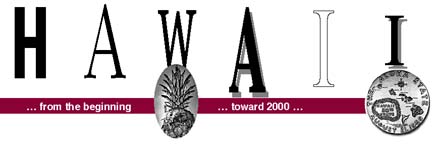


Hawaii speeds If Hawaii started the century torn between economic forces of control and a population without power, it goes into the new millennium with something of a clear-eyed feeling that as tough as it is now, together we can do better.
to turning point:
How will we be?
The boom is gone, island
institutions are in flux -- but
some say our best traditions still workOne hundred years ago, Hawaii's sugar planters, bankers and retailers were declaring themselves free of a Hawaiian monarchy and setting up a government with the hopes that the United States would take control.
And though Hawaii did become part of the United States, the islands' many peoples remember a singularly unique past.
Hawaii today, as Don Ho says about the music of the islands, "embraces the melody line of the outside world."
The debate and concern is how Hawaii will figure in the outside world, while retaining its character and essence.
"We are no longer an island economy, we are impacted by the events of the world," Wayne Minami, president and CEO of American Savings Bank, explained. "Communications today allows companies to do business in Hawaii, and the Internet allows us to do business elsewhere."
Connecting Hawaii instantly with the rest of the world brings more questions and concerns. First, is Hawaii a valuable place to do business? And second, if it is, can people in Hawaii have control over their own destiny?
"We lose sight of a lot of community and interpersonal relationships," said Minami, a former state attorney general. "Before we could pull together as a community; now, sometimes, the solutions aren't something we can do by pitching together."
Another person watching Hawaii's role in the information revolution is Randy Roth, president of the Hawaii Bar Association. He sees the state's potential for real economic growth controlled by forces outside Hawaii.
"I see the people of Hawaii becoming more realistic," Roth said. "We have resisted a lot of change that has been embraced elsewhere. I think we will awaken to the need to adjust our thinking."
For instance, the dramatic overhaul of the Bishop Estate, perhaps Hawaii's single most powerful institution -- prompted in part by an essay co-authored by Roth -- can serve as a model for change.
"Just as the Hawaiian community insisted on accountability, this will serve as a model for people in Hawaii generally to insist upon accountability from people and organizations that have great power in our state," Roth said.
The economy worries many, after Hawaii's decades of boom. First from sugar and pineapple, then military spending, then tourism, Hawaii always had a little more than enough at the end of the day.
Now the economy is sluggish, and expected to grow only in tiny steps.
"Tourism is fragile -- we just didn't think of it in those terms," said DeSoto Brown, a cultural historian and Bishop Museum archivist. "When you lose it or it falters, you realize that it can continue to falter, and it is beyond our control," he said.
"And now, I can't think of anything that is going to come along to save us."
That same worry is reflected in the concerns of organized labor, which has been another megaforce in shaping the second half of Hawaii's 20th century.
"We are in a crisis mode," said William Puette, executive director of University of Hawaii Center for Labor Education.
There has been a shift in attitudes, he said. Once, Hawaii was able to brag that its workers were so well treated, they had the best pre-paid health care in the nation.
"Now people are just saying, 'How much does this cost and how much does that cost,' " he noted.
Education also is under scrutiny. Public schools, under the guidance of new Superintendent Paul LeMahieu, are developing standards that all students must meet.
"I do feel hope," said Gloria Boylan, a 29-year public schoolteacher now at Kaimiloa Elementary in Ewa Beach. "The standards will get better and the kids will get better," she said.
"You hope you can provide them with skills to solve problems, to take risks, to excel -- they all have hopes and they want to do better."
That optimism is echoed by other educators. Patsy Tom, executive director and principal of Montessori Community School and a director of the Hawaii Association of Independent Schools, said schools have the potential to do better.
"Certainly there is a lot of discontent with society," she said. "But while we have so much (discontent), there is also change in society."
"The messages we want to share with children are how do we redefine success: Is it getting the best positions and the most money -- or is it finding ways to make contributions and to live life as meaningfully as possible?"
So the debate comes back to Hawaii's values and own internal structure. Those who help Hawaii's poor, socially disadvantaged and disenfranchised look for Hawaii to come to terms with itself in the next millennium.
The Rev. Frank Chong, Waikiki Health Center executive director and a lobbyist for social programs, calls it an issue of figuring out what to do about "the homeless, the houseless and the heritageless."
"I see the issue of identification as being critical," he said. "It will be the turning point."
Hawaii-born Heidi Ballendorf, president of the Maui United Way, agrees.
"Being sensitive to the host culture is going to be critical," she said. "I come from an island perspective and we have to work more on the give and take.
"Right now, everybody has to give a little for us all to survive."
The Honolulu Star-Bulletin is counting down to year 2000 with this special series. Each installment will chronicle important eras in Hawaii's history, featuring a timeline of that particular period. This is the final installment. About this Series
Series Archive
Project Editor: Lucy Young-Oda
Chief Photographer:Dean Sensui